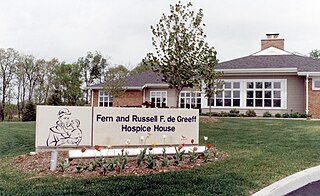Related Research Articles
Palliative care is an interdisciplinary medical caregiving approach aimed at optimizing quality of life and mitigating suffering among people with serious, complex, and often terminal illnesses. Within the published literature, many definitions of palliative care exist. The World Health Organization (WHO) describes palliative care as
"an approach that improves the quality of life of patients and their families facing the problem associated with life-threatening illness, through the prevention and relief of suffering by means of early identification and impeccable assessment and treatment of pain and other problems, physical, psychosocial, and spiritual".

The healthcare industry is an aggregation and integration of sectors within the economic system that provides goods and services to treat patients with curative, preventive, rehabilitative, and palliative care. It encompasses the creation and commercialization of products and services conducive to the preservation and restoration of well-being. The contemporary healthcare sector comprises three fundamental facets, namely services, products, and finance. It can be further subdivided into numerous sectors and categories and relies on interdisciplinary teams of highly skilled professionals and paraprofessionals to address the healthcare requirements of both individuals and communities.
A nursing home is a facility for the residential care of older people, senior citizens, or disabled people. Nursing homes may also be referred to as care homes, skilled nursing facilities (SNF) or long-term care facilities. Often, these terms have slightly different meanings to indicate whether the institutions are public or private, and whether they provide mostly assisted living, or nursing care and emergency medical care. Nursing homes are used by people who do not need to be in a hospital, but require care that is hard to provide in a home setting. The nursing home staff attends to the patients' medical and other needs. Most nursing homes have nursing aides and skilled nurses on hand 24 hours a day.

Geriatrics, or geriatric medicine, is a medical specialty focused on providing care for the unique health needs of the elderly. The term geriatrics originates from the Greek γέρων geron meaning "old man", and ιατρός iatros meaning "healer". It aims to promote health by preventing, diagnosing and treating disease in older adults. There is no defined age at which patients may be under the care of a geriatrician, or geriatric physician, a physician who specializes in the care of older people. Rather, this decision is guided by individual patient need and the caregiving structures available to them. This care may benefit those who are managing multiple chronic conditions or experiencing significant age-related complications that threaten quality of daily life. Geriatric care may be indicated if caregiving responsibilities become increasingly stressful or medically complex for family and caregivers to manage independently.

A clinic is a health facility that is primarily focused on the care of outpatients. Clinics can be privately operated or publicly managed and funded. They typically cover the primary care needs of populations in local communities, in contrast to larger hospitals which offer more specialized treatments and admit inpatients for overnight stays.

The Institute of Mental Health (IMH), formerly known as Woodbridge Hospital, is a psychiatric hospital in Hougang, Singapore.

St. Luke's Hospital is a community hospital in Singapore that provides professional healthcare services. It was named after the patron saint of the medical profession, St. Luke. St. Luke's Hospital for the Elderly Sick was registered as a voluntary welfare organization in the Registry of Societies in October 1991. It was renamed St. Luke's Hospital in September 2004 to signify the hospital's role as a community hospital while retaining its focus on geriatric care. The idea of setting up a community hospital was first mooted by a group of Christian doctors and nurses after a report from the Advisory Council on the Aged in 1988 raised important issues concerning the lack of adequate elderly care facilities in Singapore. A projection of the number of facilities and resources needed to provide adequate healthcare services to Singapore's aging population in 2030 revealed serious shortfalls. In response to the problem of inadequate healthcare facilities for the elderly, a group of 8 churches and Christian organizations including the Graduate Christian Fellowship and the Singapore Nurses' Christian Fellowship, came together to set up St. Luke's Hospital for the Elderly Sick. St. Luke's Hospital is headed by a board of directors and various committees that oversee the daily operations of the hospital.

Hospice care is a type of health care that focuses on the palliation of a terminally ill patient's pain and symptoms and attending to their emotional and spiritual needs at the end of life. Hospice care prioritizes comfort and quality of life by reducing pain and suffering. Hospice care provides an alternative to therapies focused on life-prolonging measures that may be arduous, likely to cause more symptoms, or are not aligned with a person's goals.
Los Angeles Jewish Home is a non-profit provider for senior healthcare services in Los Angeles, California. It is also commonly known as “the Jewish Home,” or simply “the Home.” Over the past century, the organisation has mainly focused on providing their healthcare services for the seniors throughout the greater Los Angeles area.

Belgium has a universal healthcare system, which is composed of three parts: first, there is a primarily publicly-funded healthcare and social security service run by the federal government, which organises and regulates healthcare; independent private/public practitioners, university/semi-private hospitals and care institutions. There are a few private hospitals. Secondly is the insurance coverage provided for patients. Finally, industry coverage, which covers the production and distribution of healthcare products for research and development. The primary aspect of this research is done in universities and hospitals.

Examples of health care systems of the world, sorted by continent, are as follows.
Government-guaranteed health care for all citizens of a country, often called universal health care, is a broad concept that has been implemented in several ways. The common denominator for all such programs is some form of government action aimed at broadly extending access to health care and setting minimum standards. Most implement universal health care through legislation, regulation, and taxation. Legislation and regulation direct what care must be provided, to whom, and on what basis.
HelpAge India is an Indian organization focused on the concerns of elders and support geriatric initiatives. Established in 1978, The aim is to serve disadvantaged elders in a holistic manner, enabling them to live active, dignified, and healthier lives.

India has a multi-payer universal health care model that is paid for by a combination of public and government regulated private health insurances along with the element of almost entirely tax-funded public hospitals. The public hospital system is essentially free for all Indian residents except for small, often symbolic co-payments in some services. Economic Survey 2022-23 highlighted that the Central and State Governments’ budgeted expenditure on the health sector reached 2.1% of GDP in FY23 and 2.2% in FY22, against 1.6% in FY21. India ranks 78th and has one of the lowest healthcare spending as a percent of GDP. It ranks 77th on the list of countries by total health expenditure per capita.
The John A. Hartford Foundation is a private United States–based philanthropy whose current mission is to improve the care of older adults. For many years, it made grants for research and education in geriatric medicine, nursing and social work. It now focuses on three priority areas: creating age-friendly health systems, supporting family caregivers and improving serious illness, and end-of-life care.
Pallium India is a national registered charitable trust formed in 2003 aimed at providing quality palliative care and effective pain relief for patients in India. Dr. M. R. Rajagopal is the founder and chairman of Pallium India. The organization works with national and international organisations to improve the accessibility and affordability of pain relief drugs (opioids) and other low-cost medicines, to ensure the availability of palliative care services in India and to improve the quality of palliative care services provided by the healthcare and allied health care professionals. In February 2016, Pallium India was accredited by Social Justice Department of Government of Kerala.

Voluntary Health Services, popularly known as the VHS Hospital, is a multispecialty tertiary care referral hospital in the south Indian state of Tamil Nadu, reportedly serving the economically weaker sections of the society. It was founded in 1958 by Krishnaswami Srinivas Sanjivi, an Indian physician, social worker and a winner of Padma Shri and Padma Bhushan awards and is run by a charitable non governmental organization of the same name. The hospital is situated along Rajiv Gandhi Salai at Taramani, in Chennai.

The Minneapolis Veterans Affairs Health Care System (VAHCS) is network of hospital and outpatient clinics based in Minneapolis, Minnesota, USA. It belongs to the VISN23 VA Midwest Health Care Network managed by the Veterans Health Administration of the Department of Veterans Affairs. The Minneapolis VAHCS provides healthcare for United States military veterans in areas such as medicine, surgery, psychiatry, physical medicine and rehabilitation, neurology, oncology, dentistry, geriatrics and extended care. As a teaching hospital, it operates comprehensive training programs for multiple treatment specialties. The Minneapolis VAHCS also hosts one of the largest research programs of any VA health care system and maintains research affiliations with the University of Minnesota.

Aastha Hospice & Geriatric Care Centre is an Indian charitable organisation and research institute located at Aliganj in Lucknow, India. It provides specialised geriatric services for elderly patients. One of the services provided is an old age shelter home at its Aastha Old Age Home Resort.
The Kerala Social Security Mission (KSSM) is a government initiative aimed at providing social welfare services and support to vulnerable populations in the state of Kerala, India. Established under the Department of Social Justice, KSSM plays a crucial role in ensuring social security for marginalized groups, including elderly citizens, disabled individuals, widows, and people living below the poverty line. The mission seeks to enhance the quality of life for these communities by offering various welfare programs, healthcare initiatives, and financial aid schemes. The initiative was started in 2008 as a charitable society under the Government of Kerala.
References
- 1 2 "Vayomithram scheme". Social Justice Department. Retrieved 11 December 2024.
- ↑ "Kochi joins WHO network with a goal to become age-friendly". www.who.int. Retrieved 11 December 2024.
- ↑ "Vayomithram project now in Mukkom". The Hindu. 8 October 2017. Retrieved 11 December 2024.
- ↑ "Project to make state friendly for dementia patients set for rollout". The New Indian Express. 1 February 2024. Retrieved 11 December 2024.
- ↑ "Government Schemes for the benefit of senior citizens in India: An overview" (PDF). International Journal of Social Sciences and Economic Research. Retrieved 11 December 2024.
- ↑ "Vayomithram – Social Security Missi". Government of Kerala. Retrieved 11 December 2024.